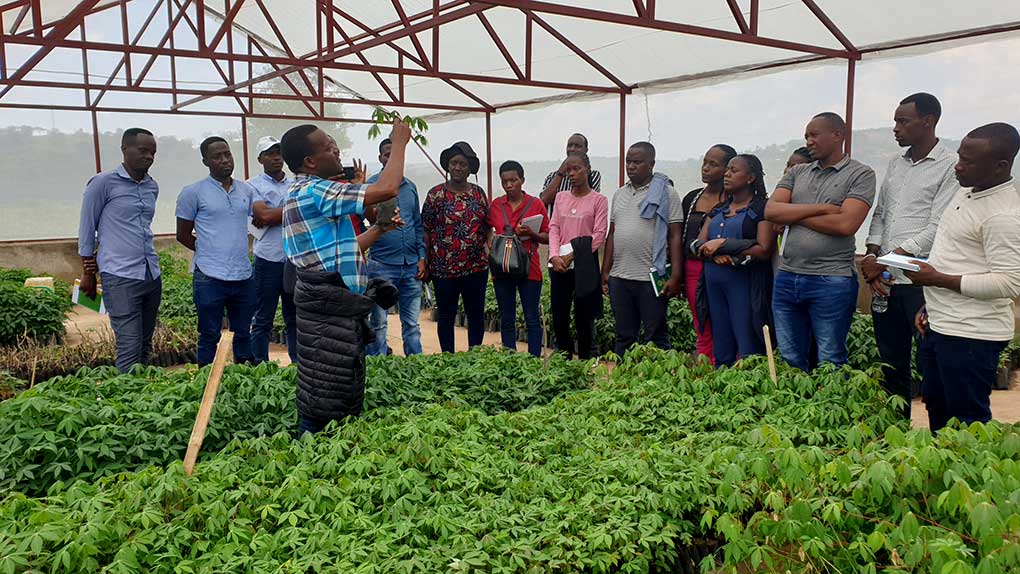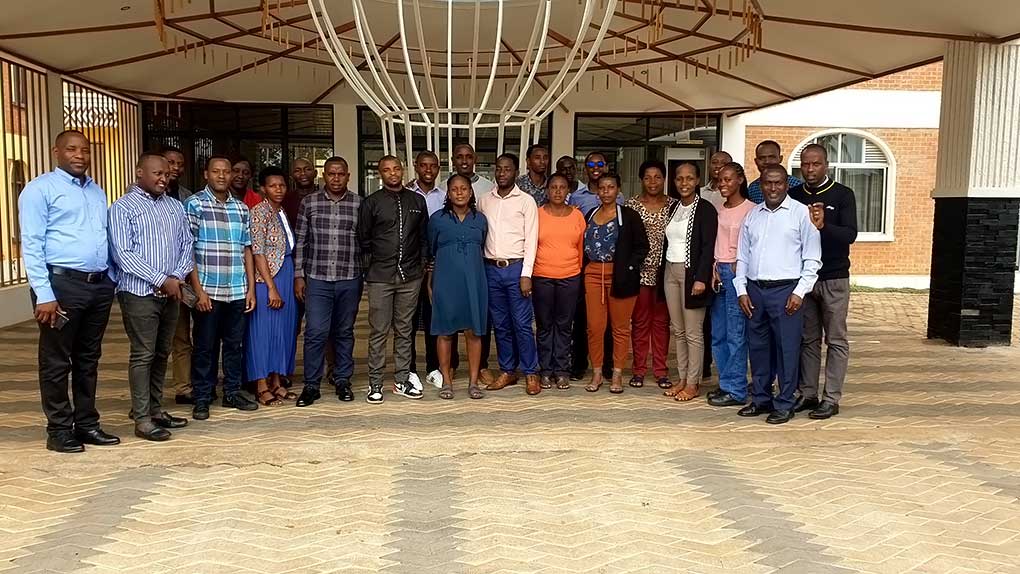
Dr. Athanase Nduwumuremyi, a cassava seed systems expert in Rwanda, emphasized the importance of a strong seed certification and inspection framework while sharing Rwanda’s experience
The training was designed to enhance human capacities for cassava seed inspection and certification as a critical element of building a sustainable formal cassava seed value chain in Rwanda. The primary challenge is the shortage of quality cassava seeds and the prevalence of unclean seeds among cassava farmers. This has a cascading effect, leading to reduced productivity and yields of cassava for both household consumption and market access. The root cause lies in the rudimentary nature of the cassava seed system in Rwanda, where farmers exchange seeds among themselves, inadvertently spreading plant diseases and distributing substandard seeds.
The Ministry of Agriculture in Rwanda, in collaboration with various partners, has been working to build and strengthen the cassava seed sector. IITA, a longstanding partner of the Ministry, has identified the shortcomings in the sector. In a collaborative effort with MEDA; an international economic development organization that creates business solutions to poverty, supported the Bill and Melinda Gates Foundation-funded project known as the ViRCA Deployment Project, which aim is to produce and provide smallholder farmers with high-performing cassava planting materials, resistant to Cassava Brown Streak Disease (CBSD) and Cassava Mosaic Disease (CMD). Additionally, the project seeks to establish an effective cassava seed system in Rwanda.
The project seeks to strengthen the national seed quality assurance systems. This includes refresher training on cassava seed inspection and certification, the implementation of cassava inspection protocols, seed tracking and traceability, managing pests and diseases, and understanding the cassava seed value chain. The project also incorporates the use of inspection technologies to enhance the quality of cassava seeds.
The training, held from 19th to 21st September 2023, was attended by both public and private seed inspectors in Rwanda. They play a pivotal role in the seed systems of the country and are responsible for ensuring the quality and integrity of cassava seeds that are distributed to farmers.

Private and Public seed inspectors in Rwanda trained by IITA and MEDA on cassava seed inspection and certification
The training covered a range of topics critical to cassava seed inspection and certification such as cassava seed inspection and certification procedures, field identification of symptoms of cassava pests and diseases, using of PlantVillage NURU – a phone app to identify pest and disease symptoms, identifying different varieties, understanding different seed classes, as well as importance and functionalities of seed tracker – a digital tool that helps in the process of seed inspection and marketing..
Trainers received hands-on guidance on utilizing IITA’s digital tools, including the PlantVillage Nuru App and Seed Tracker, to identify cassava symptoms and diseases in the field
Participants gained valuable insights and practical skills during the training. One inspector noted, “The training has equipped us with the knowledge and skills needed to conduct cassava seed inspection and certification professionally. This will be a primary indicator of a well-functioning cassava seed system.” They highlighted the importance of their role in ensuring that only high-quality seeds reach farmers, thereby improving crop yields and food security.
The cassava seed inspection and certification training directly benefits cassava farmers by providing them with access to clean planting materials. This, in turn, can lead to increased crop yields, better food security, and improved livelihoods for smallholder farmers. On the policy and institutional front, it promotes a more organized and sustainable cassava seed system in Rwanda, which is essential for sustainable agricultural development.
This specific project builds upon previous interventions by CGIAR and IITA in the cassava seed system in Rwanda. These interventions have focused on improving cassava varieties, disease resistance, and overall seed quality. The ViRCA Deployment Project represents a continued commitment to these objectives, with a specific focus on enhanced capacities for cassava seed inspection and certification by Rwanda Inspectorate, Competition and Consumer Protection Authority (RICA).




No Comments